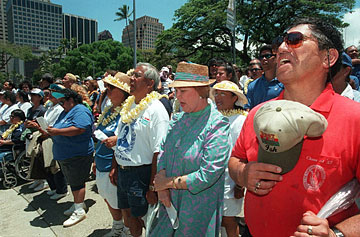LEGACY BETRAYED

HOME | INTRODUCTION | FOREWORD | CHAPTERS 5 & 8 | TIMELINE
Excerpts: Introduction
Written by David Shapiro, former managing editor of the Honolulu Star-Bulletin
WHEN RANDALL ROTH came to the Honolulu Star-Bulletin late on the afternoon of August 7, 1997, and asked editorial page editor Diane Chang and me to publish the essay that would become known as "Broken Trust," I sensed I was looking at something of monumental importance. This essay was a bare-knuckled attack on the trustees of Kamehameha Schools/Bishop Estate, a charitable trust of unprecedented power, with lines tracing back to Hawaii's monarchy as the century-old bequest of a Hawaiian princess who desired to improve the lives of Hawaiian children.
A 1995 Wall Street Journal article described Bishop Estate as "the nation's wealthiest charity," with an endowment estimated at $10 billion -- greater than the combined endowments of Harvard and Yale universities. With vast land holdings in a small island state, Bishop Estate wasn't bashful about flexing its muscles, and its influence reached deep into Hawaii's government, judiciary and business communities in incestuous relationships that increasingly reeked of corruption.

STAR-BULLETIN / 1997
Members of the Kamehameha Schools ohana paused to sing near the statue of King Kamehameha on March 15, 1997, before resuming their march to the Bishop Estate's downtown office.
|
|
The opening of "Broken Trust" was blunt: "The community has lost faith in Bishop Estate trustees, in how they are chosen, how much they are paid, how they govern. The time has come to say 'no more.'" Strong words, but the essay was more than just rhetoric. It went on to document the misdealings surrounding Bishop Estate -- and their devastating impact on beneficiaries of the trust -- as never before. It detailed how trustee appointments, which paid nearly $1 million a year, were rigged by politicians and judges; how trustees lined their pockets at the expense of the institution's bottom line; how the supposed protectors of the trust, the attorney general and courts, looked the other way; how investment results were manipulated to mislead, with no accountability; and how Kamehameha Schools, the core of the trust's mission, was being scandalously shortchanged at every step. ...
Many of these violations had long been suspected, but they had never been publicly spelled out in a community where even honorable people were reluctant to tangle with the immensely powerful trustees and their legion of loyal supporters among native Hawaiians.
AS IMPORTANT as what "Broken Trust" said was who was saying it. Roth was a respected professor of trust law at the University of Hawaii, but it was his four co-authors -- importantly, all of native Hawaiian ancestry -- who carried the weight: Samuel King, a senior U.S. District Court judge; Monsignor Charles Kekumano, a Catholic priest, chairman of the Queen Liliuokalani Trust and former chairman of the Honolulu Police Commission; Walter Heen, a retired state appeals court judge and former Democratic state legislator and Honolulu City Councilman; and Gladys Brandt, a retired principal of Kamehameha School for Girls and a former chairwoman of the University of Hawaii board of regents. These were not bomb-throwers, but the most solid of citizens, venerable community leaders who enjoyed wide respect among Hawaiians and non-Hawaiians alike.
Roth brought the essay to the Star-Bulletin after first offering it to our larger competitor, the Honolulu Advertiser, where the authors had been unable to reach agreement with editors on either a form or a time frame for publication. At the time, there was a major controversy swirling in the Hawaiian community over a trustee's mismanagement of Kamehameha Schools, and the authors of "Broken Trust" wanted to get their essay into print before the trustees moved to purge the school of its popular president, Michael Chun, and of four Kamehameha teachers who had dared to question the trustees publicly. ...
HISTORICALLY, all of Hawaii had generally maintained a hands-off attitude when it came to Bishop Estate. Some feared invoking the wrath of the trustees and their loyal native Hawaiian supporters. But mostly, the reluctance to get involved sprang from the view that Kamehameha Schools was a sacred Hawaiian institution and even honest citizens and public officials were disinclined to interfere in its affairs if Hawaiians weren't complaining. ...
A turning point (had come) in 1993, when the trustee board included two political heavyweights, former House Speaker Henry Peters and former Senate President Richard "Dickie" Wong, and two old-school trustees, Myron "Pinky" Thompson and Oswald Stender. The swing trustee was Lokelani Lindsey, a career bureaucrat in the Department of Education who had recently run unsuccessfully as the Democratic candidate for mayor of Maui. ... (Peters and Wong) needed Lindsey's vote to solidify their power, and to get it they named her lead trustee for education, which gave her absolute authority over Kamehameha Schools.
Unfortunately, neither the justices nor Peters and Wong had done their homework on Lindsey, who would soon become the public embodiment of everything that was broken about the trust. She was crude, imperious and unpleasant, with controversial notions about education. ... She held a low opinion of the Kamehameha Schools administration and staff and had little interest in what alumni had to say. Her capricious dictates were not open to discussion, and her power tool of choice was intimidation.
At first the Kamehameha ohana -- teachers, students, alumni and parents -- tried to heal the unpleasantness with respectful requests to the trustees to talk things out, as is the Hawaiian way. But when the trustees stubbornly refused to "talk story," the ohana banded together in a group that called itself Na Pua a Ke Alii Pauahi -- the Children of Princess Pauahi -- and staged an emotional and unprecedented march on Bishop Estate headquarters at Kawaiahao Plaza in May 1997. The fight was on. ...
UNTIL THE "Broken Trust" authors weighed in, the trustees faced a limited battlefront -- Lindsey's micromanagement of Kamehameha Schools. The trustees could have ended the dispute at any time by simply reining in Lindsey and restoring respectful communications with the ohana. ... "Broken Trust" changed everything by demanding that the trustees be held accountable for the breaches of trust that had occurred throughout Bishop Estate operations, moving the conflict beyond Lindsey and Kamehameha Schools. It was devastating in its indictment, not only of the trustees, but also of the judiciary and Hawaii's political establishment. ...
"Broken Trust" brought the controversy to critical mass. In short order, the governor asked the attorney general to investigate, Supreme Court justices reluctantly agreed to stop appointing trustees, a court-appointed master confirmed the charges about trustee misconduct, and a retired judge hired at the request of the trustees to whitewash problems at Kamehameha Schools instead indicted Lindsey for everything she had been accused of and more.
It took nearly two years of often chaotic legal wrangling, but in May 1999 the Internal Revenue Service forced the hand of local courts by threatening to revoke Bishop Estate's tax-exempt status if the current trustees stayed on the job. ...
Change came fast at Kamehameha Schools. The probate court imposed term limits on trustees and drastically reduced their compensation. A court order forced trustees to appoint a chief executive officer and to nominally step away from daily operations to fulfill the more traditional oversight role expected of the boards of charitable trusts. Investment policies were cleaned up, and spending on the core mission of educating Hawaiian children increased dramatically. ...
Still, elements of the resolution were ominous for the future. Once the trustees were removed, their replacements pressed for "closure and healing," with no apparent concern for accountability. Judges and other public officials, who felt they had aired enough of their dirty laundry and wanted nothing more than for it to be over, gladly embraced the call for "healing." Legal proceedings were concluded quickly, and no attempt was made to assess damages or collect restitution from the trustees -- or from their lawyers and contractors -- for the millions of dollars in losses attributable to the breaches of trust.
THE IMPACT of the Bishop Estate scandal in the broad community was far-reaching and profound. It exposed Hawaii's political rot and helped set the stage for putting a new party in the governor's office. ... It showed Hawaiians what they could accomplish when they worked together. ... "Broken Trust" (also) proved the value of having two competing newspapers in a city and was recognized as a major reason for the public outrage and landmark litigation that forced owners who tried to shut down the Star-Bulletin in 1999 to instead sell to a new owner, who kept it publishing. Trustee Henry Peters told CBS's "60 Minutes" that his biggest regret was not buying the Star-Bulletin when it was first offered for sale in 1992, so that trustees could have stopped "Broken Trust" and controlled the coverage of the scandal. ...
By far the most important effect of the fall of the Bishop Estate trustees was to energize the community spirit and elevate public expectations, ending the pervasive and demoralizing perception that official corruption was an inescapable fact of life in Hawaii -- the price of living in paradise. As (former Bishop Estate master Colbert) Matsumoto put it, "This story is really about the democratic process -- people standing up to do the right thing despite odds and intimidation."
The Bishop Estate scandal inspired a chorus of "no mores" that reverberated through other power centers in Hawaii. Two members of the Honolulu City Council and four state legislators were sentenced to prison for corruption -- two of them for offenses directly related to Bishop Estate -- as federal and state prosecutors became newly aggressive in weeding out public corruption. ... Gary Rodrigues, one of the state's most politically powerful labor leaders and a member of both the Judicial Selection Commission and the Supreme Court's blue-ribbon panel to screen Bishop Estate candidates, was convicted of multiple counts of fraud. ... Before the Bishop Estate trustees fell, corrupt officials felt confident they could act with impunity; after, they had to seriously fear being caught and punished.
|
WANT TO COMMENT?
The Star-Bulletin welcomes reader responses to this week's excerpts from the new book "Broken Trust: Greed, Mismanagement and Political Manipulation," by federal Judge Samuel P. King and trust law professor Randall W. Roth.
A selection of the responses we receive by this Thursday will be published in the Insight section next Sunday, March 5. We prefer letters of no more than 200 words, but longer responses also will be considered for publication. Letters must include the writer's name, address and daytime telephone number.
Send letters to:
» E-mail: letters@starbulletin.com
» Fax: 808-529-4750
» Mail: Letters to the Editor, Honolulu Star-Bulletin,
7 Waterfront Plaza, 500 Ala Moana, Suite 210,
Honolulu, HI 96813
|

